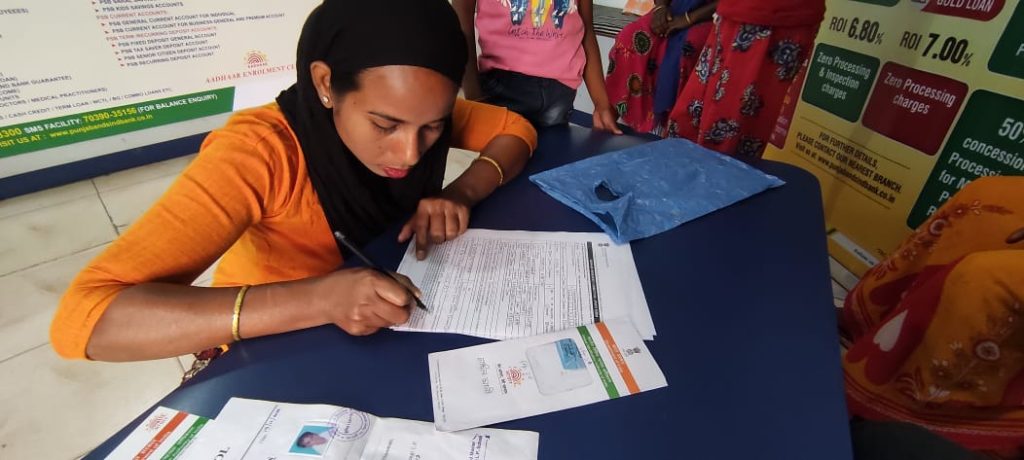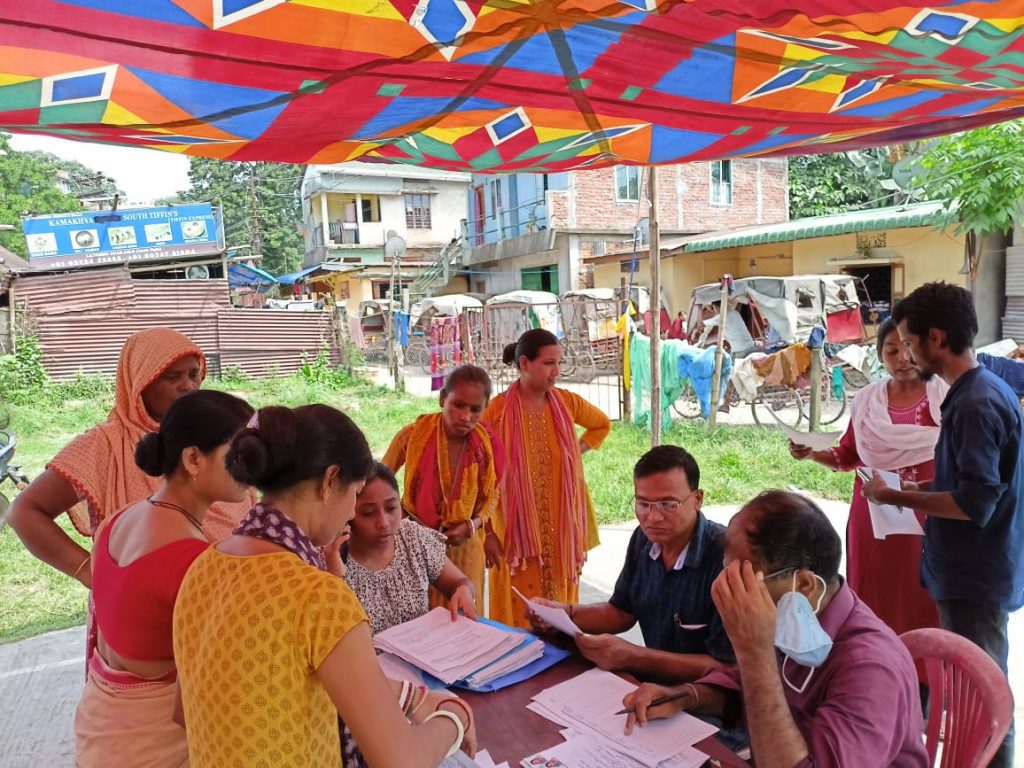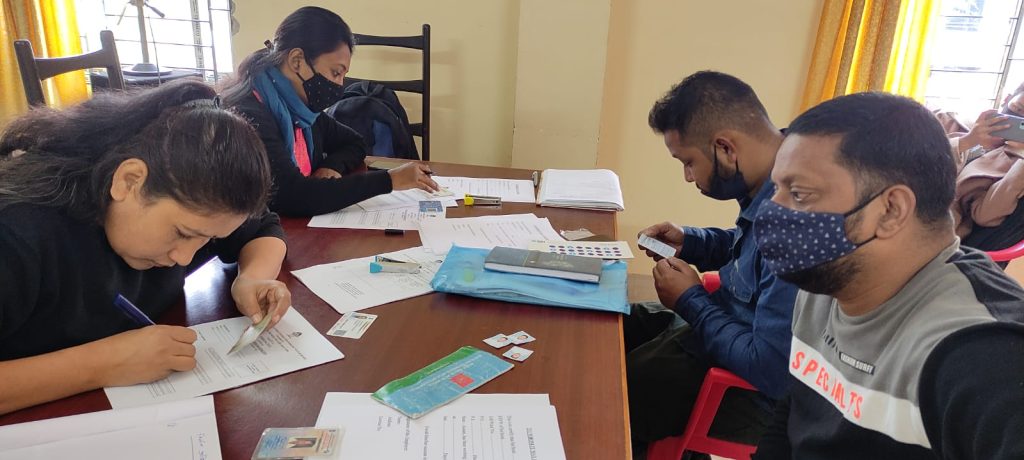This is the first part of a two-part blog on the challenges being faced by residents of informal settlements in Guwahati in accessing social protection entitlements in absence of Aadhar and the campaign by YUVA to addres these challenges. The second part can be read here.
Aamina, 50 (Name changed to protect the identity of the resident)
Aamina is a member of minority community and resident of an informal settlement in Guwahati who has been unable to acquire her Aadhaar, a 12-digit unique identification number issued by the UIDAI. Even though she continues to receive ration from the local PDS, the PDS shop has been demanding the seeding of her Aadhaar with her ration card, without which she will soon stop receiving her monthly ration needs.
Aamina is a domestic worker, and the only other breadwinner of her family is her son who works as a driver in the city; her daughter studies in the 7th standard. Aamina aspires to have a home of her own and wants to apply for a house under the Pradhan Mantri Awas Yojana but without Aadhaar, she is unable to apply for this scheme. In the hopes of getting Aadhaar, she has also been scammed by brokers who she paid token money to no avail.
While the Aadhaar (India’s unique identification number) was in the process of becoming the most important document across the length and breadth of the country, in Assam only six per cent of the population had been covered till 2017.

The Assam government did not want the enrollment for Aadhar to happen before the completion of the compilation of the National Register of Citizens (NRC). The deeply contested NRC process took place in the state of Assam under the supervision of the Supreme Court and lasted from 2013 to 2019. During the claims and objections phase of the NRC, biometric data of over 27 lakh people was collected. The draft NRC list that was published on 31st August 2019 which led to the exclusion of 19 lakh names and the biometric data collected during the claims and objections phase has since been locked because of the contestation over the finality of the NRC. This essentially means that people who submitted their biometric data during that period and did not have an Aadhaar card, would not be able to get the Aadhaar till the ‘final NRC’ is completed and the biometric data is released.
People who found their names on the list of NRC and those who have been excluded from the latest NRC list are both now unable to acquire their Aadhaar because of the freeze on their biometric data provided during the claims and objections period. Aamina’s case is one such example. While everyone else in her family found their names in the draft NRC published in August 2019, Aamina’s name was excluded. But despite this exclusion, Aamina is still eligible for Aadhaar and other social welfare schemes that will enable her to lead a better life. This non-issuance of Aadhaar poses a challenge, especially for those like Aamina who are dependent on social protection schemes, access to which is possible only with the unique identification number of Aadhaar.
Moreover, Aadhaar has become necessary to access other basic identity documents and services like bank accounts, pan cards, passports, admission to educational institutions, and applications for loans. Without this critical document, many in Assam are now struggling to make ends meet. Despite the portability of social security schemes like One Nation One Ration Card (ONORC) which aims to achieve food security for the economically weaker sections, without an Aadhaar card many are unable to benefit from such schemes. Not only basic necessities like food but also access to other schemes like Pradhan Mantri Awas Yojana (housing scheme), pension schemes, and schemes for maternal and child health is also impeded.
Neha (Name changed to protect the identity of the resident)
Neha is one such person who belongs to a Scheduled Caste community and resides in Guwahati, in Assam. She has been unable to get her Aadhaar card due to the locking of biometric details collected during the process of updating the NRC. Neha’s family consists of her elderly mother and a 10-year-old niece, whose parents (Neha’s sister and brother-in-law) passed away leaving their daughter in the care of Neha and her mother. Neha who is the sole breadwinner of the family works as a domestic worker and a saleswoman in a community store. The family lives in an informal settlement next to the railway tracks. Their house, made of thatch and bamboo, has undergone several damages due to rains. To avail a loan to fix these damages, Neha wanted to setup a bank account for months. Now that she has a bank account, she is not eligible for loans till she furnishes her Aadhaar card. This is only one of the challenges Neha and her family are facing. She is also unable to access the PDS ration because of this missing document. With a household monthly income of INR 5000, the family is continuing to struggle without Aadhaar.
It’s been a year since the apex court issued a directive that asked all states and UTs to implement One Nation One Ration Card (ONORC) system across the country. However, till recently 4 states including Assam, Chhattisgarh, Delhi, and West Bengal were yet to implement the scheme which allows for inter- and intra-state portability of ration entitlements. The intention of the ONORC scheme has been to support migrant workers spread across the country to avail food security through any fair price shops under the National Food Security Act of 2013. This scheme gained importance during the crisis during the first COVID19-induced lockdown which saw the mass exodus of migrants. Steps like the portability of ration cards are to make social security schemes as robust during times of crisis as they are during peace times. However, this is not the case in Assam. The linkage of Aadhaar with ration cards is thus another hindrance in accessing this basic document. Currently, in communities where YUVA has actively been engaged, there are both people with and without Aadhaar who have not been able to access ration cards because of administrative delays.
In a direction issued by the Gauhati High Court dated 26th December 2021, the state government was asked to identify the ration card beneficiaries in informal settlements of Guwahati. This direction came as a result of a PIL filed challenging the delay in the issuance of ration cards to households in the informal settlements of the city. According to the state, this delay was caused because the beneficiaries could not be identified by the concerned counselor of the respective municipal boards and the delay in Gauhati Municipal Corporation election meant there were no ward commissioners (elected representatives) to identify these applicants. But with due efforts of YUVA, around 200 applications across several communities were submitted to the Food and Civil Supplies Department which have been taken into consideration and the food inspector approached us for verification of the applications. Through three verification camps all the applications were verified and now the applications are under process. However even after this directive and the municipal corporation elections, many in the informal settlements of Guwahati are yet to receive their ration cards due to non availability of Aadhaar and the freezing of biometrics during NRC.

Recently, the Assam Government said that they will implement the ONORC (One Nation One Ration Card) system from 30th May 2022 over multiple phases. While this is an initiative in the right direction, the main hurdles that have led to the non issuance of ration cards are yet to be resolved. Seeding of Aadhaar with ration cards is one of the core components under ONORC. And with the biometric freeze, people belonging to underserved and vulnerable communities will further be distanced from accessing food subsidies. Even for that section of the population who have Aadhaar only 28 percent of cardholders in the state have Aadhaar numbers linked with their ration cards. Besides, the issue of administrative delays in issuing ration cards still remains a cause of concern.
There has been a recent effort by the Assam Government to urge the Centre to issue Aadhaar cards to those whose biometrics data was locked during the NRC process since any more delay in issuance is bound to affect those who are already suffering the brunt. The Supreme Court on 11th April 2022 also issued a notice to the Union and the state government in response to a PIL seeking directions to issue Aadhaar cards to those persons whose biometric details were locked. The apex court has sought a response from the Centre, the Assam government, the Registrar General of India (RGI) and the Unique Identification Authority of India (UIDAI) on or before 17th May 2022.
Since Aadhaar is not a proof of citizenship, both those who find their names in the NRC and those who don’t, are entitled to this critical document which will enable access to a host of other welfare and social security schemes.
Rekha (Name changed to protect identity)
Rekha, her husband and their two sons who live in the informal settlements of Narengi’s Lala Basti are one of many migrant families from Bihar settled in Guwahati. Rekha’s husband is a construction worker in the city who was born in Assam after his parents moved here in search of livelihood decades ago, before his birth. Rekha moved to Guwahati after her marriage, 12 years ago. Rekha and her husband have identity documents like Aadhaar card, Pan card, and Voter ID card, but despite these documents, they have not been able to get a ration card in the city.
They have applied several times but to no avail. While the Fair Price Shops are often vague about the process someone has to follow to apply for a ration card, even when one does manage to apply for it, at times it takes years to get a ration card. Rekha and her husband have been scammed by third-party agents like brokers, who promise them access to a ration card and then disappear thereafter.
Ironically, it was during COVID19 induced lockdowns that the family received ration support from the government. Rekha says, “We wouldn’t lie that the government did provide ration kits during covid when my husband was out of work. Everyone in the basti got relief irrespective of whether they had ration cards or not. But now we are back where we started, with no ration card, we struggle to make ends meet.”

Image 3: A Camp organized by YUVA for facilitation of entitlements
Arunima (Name changed to protect identity)
Arunima, who belongs to a Scheduled Caste community, is a widow who lives by herself in a makeshift house made of thatch and bamboo. Her native village is in Pathsala, Assam but Arunima has grown up in Guwahati. Arunima who is 40 years of age, earns a living through daily wage work.
Despite having documents like Aadhaar card, Pan card, Voter ID, Arunima does not have a ration card, nor does she receive benefits from schemes like the Widow pension scheme. When Arunima applied for a ration card, she was told that they were not accepting new applications because of a transition in the administrative body. But even after three years Arunima still does not get any ration support.
Arunima says, “I live a lonesome hard life, if I got even some support through ration I would be able to meet my other basic needs.” During monsoon, the entire basti is submerged in water and Arunima and her neighbours move upwards to slightly elevated lands and live in makeshift tents. During such difficult times, Arunima has to rely on the goodwill of her neighbours and relatives to survive.
Arunima and Rekha are among many in Guwahati who have been denied a life of dignity because of their exclusion from their social and legal entitlements. Despite advocacy efforts of civil society organizations and the recent PIL filed at the Gauhati High Court, there’s yet no immediate relief for these families.
Syeda Mehzebin Rahman is the Project Lead in Guwahati for Youth For Unity and Voluntary Action (YUVA).


